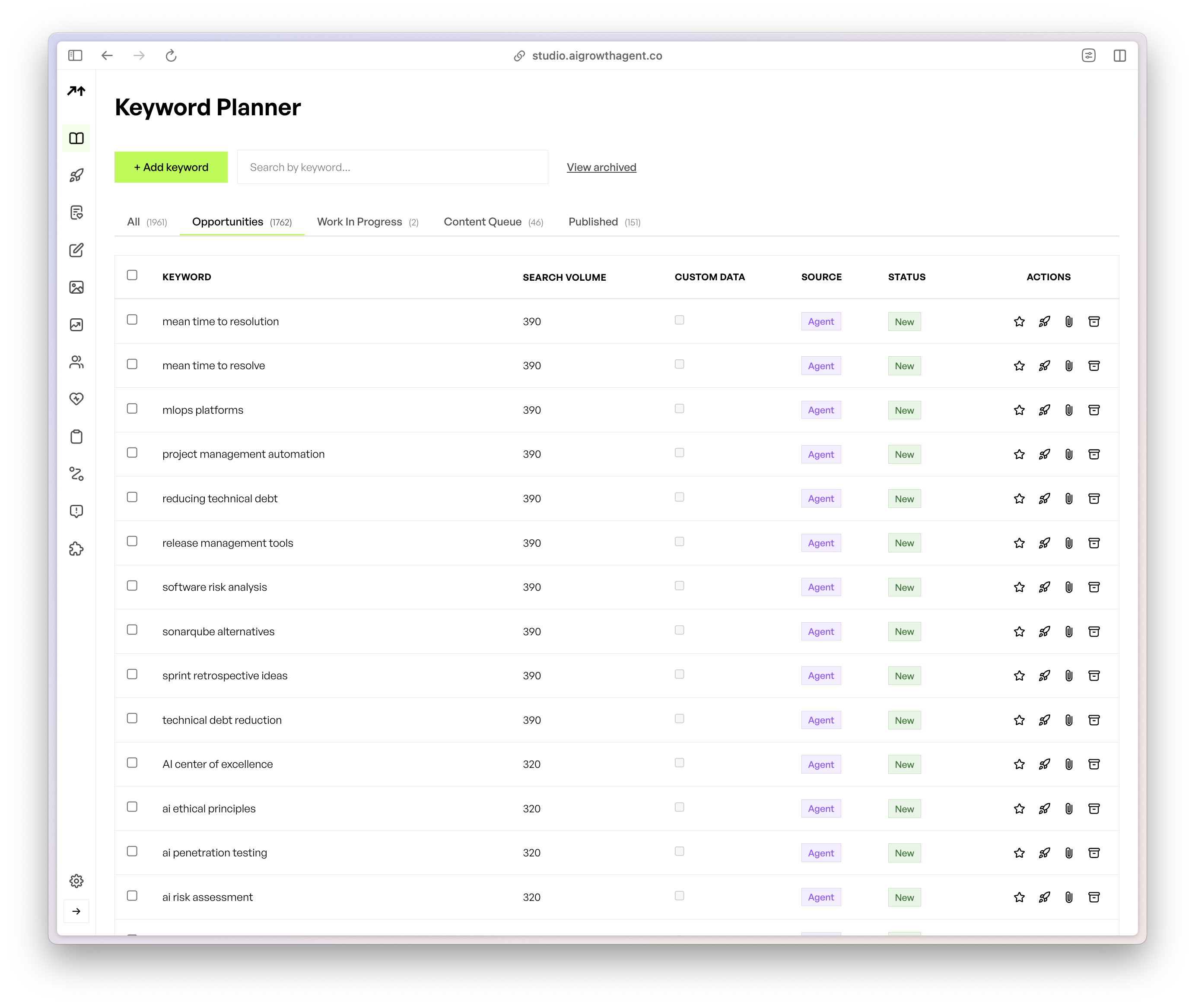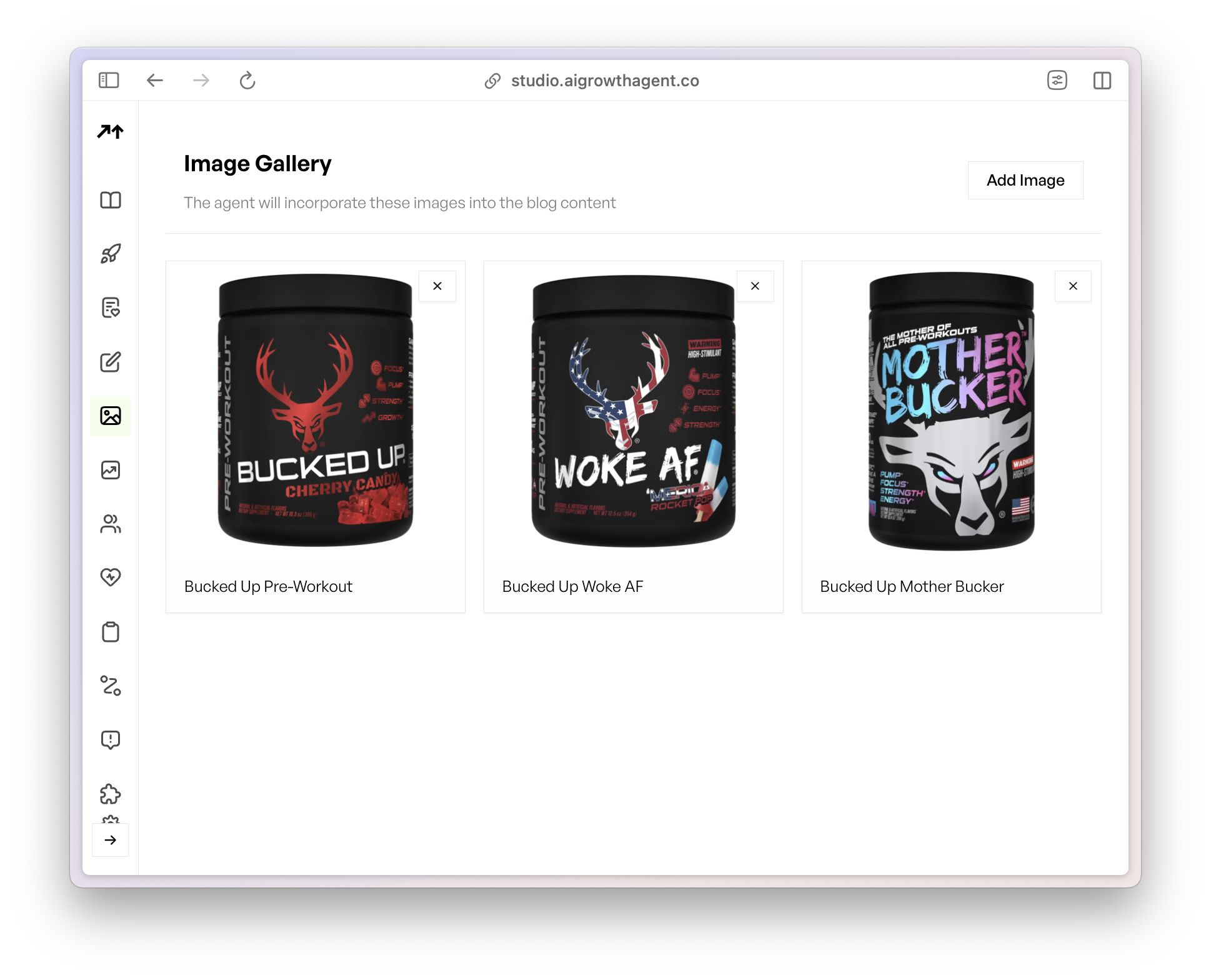AI-powered search engines like ChatGPT, Gemini, and Perplexity are changing how brands gain visibility online. More users now turn to conversational, natural-language queries on these platforms instead of traditional search engines.
This guide offers enterprise marketing leaders a clear strategy to adapt blog marketing to this shift. We’ll cover why AI search matters, how optimization differs today, key trends to watch, and practical steps to ensure your blog gets cited by AI systems while showing measurable results.
Why AI Search Requires a Fresh Approach
Digital marketing must adapt quickly to a major shift. AI tools, such as Large Language Models (LLMs) and conversational interfaces, are becoming primary ways customers discover brands. Traditional search optimization, focused on keywords and backlinks, no longer meets the needs of this new environment.
AI systems often provide direct answers on results pages, reducing clicks to websites. If your content lacks depth or authority, AI will likely favor competitors’ material, citing their perspectives instead. Your online presence diminishes each day without a strong strategy to establish expertise.
Content also needs frequent updates. Publishing a few blog posts each month won’t keep you relevant when AI prioritizes fresh, consistent material. Staying visible means adapting fast to these demands.
Ready to update your blog strategy for AI search? Schedule a consultation at AI Growth Agent to explore tailored solutions.
How AI Search Optimization Differs from Traditional SEO
Digital marketing goals have shifted. While traditional SEO aimed for high rankings on search result pages, AI search optimization focuses on getting cited in AI responses across models like GPT-5 and Gemini. The priority is no longer just visibility in listings but earning recommendations from AI systems.
AI doesn’t simply catalog content. It evaluates and suggests based on authority, relevance, and trust factors. This requires a new focus on conversational language, deeper content structures, and metrics that reflect AI citation rather than just clicks or rankings.
Enterprises need to rethink content creation, technical setups, and performance tracking. Adjusting to conversational queries and AI algorithms across multiple platforms is now essential for success.
Establishing Authority with a Strong Blog Strategy for AI Citations
Build a Content Foundation with Pillars and Clusters
Creating authority means organizing content in a way AI can easily interpret. Focus on detailed pillar pages that cover broad industry topics, connected to supporting cluster articles. This structure signals expertise to AI systems.
Pillar pages act as core resources, diving deep into major subjects relevant to your audience. They position your brand as a trusted source, offering the comprehensive detail AI looks for when citing content. Cluster articles explore specific aspects of these topics.
Create Content for Conversational Queries
AI responds to user questions phrased naturally, so content must match this style. Write in a way that directly answers likely queries while keeping clarity for both people and AI.
Use structural elements like headings, bullet points, FAQs, and summaries to make content easy for AI to process. Include schema markup to enhance machine readability. Address user questions with precise, authoritative answers that AI can confidently pull into responses.
Keep Content Fresh for Ongoing Relevance
AI favors recent content when selecting sources to cite. Publish regularly to show active expertise, as a steady flow of updates signals reliability to AI systems. Daily high-quality posts are often necessary to stay competitive in this fast-moving space.
Updating older content also matters. Refresh existing posts with new data, current examples, and relevant industry updates. These signals of recency, beyond just publication dates, help AI determine which content best matches user needs.
Technical Setup for AI Search Success
Use Structured Data for Better AI Understanding
Schema.org markup helps AI interpret your content’s purpose and structure. This technical step increases the chance of appearing in AI summaries or featured responses by clarifying what your material covers.
Specific schemas, like Article for thought leadership or FAQPage for direct answers, guide AI on how to present your content. Implementing detailed relationships and hierarchies further connects your topics to broader industry themes, improving citation odds.
Enable Direct Communication with AI Systems
Advanced indexing methods allow AI to interact directly with your content. Tools like LLM.txt files give specific guidance to AI crawlers on how to use your material. Enhanced robots.txt setups direct AI to prioritize your most valuable pages.
The Model Context Protocol (MCP) offers a direct link between AI and your content system, enabling real-time discovery of updates. These setups often need technical expertise to balance accessibility with site security.
Optimize Images for AI Recognition
AI evaluates multimedia, so images play a key role in content strategy. Beyond basic alt-text, ensure images have detailed metadata and align with surrounding text to provide context.
Place images strategically to support main points, improving readability for users and AI alike. Use existing visual libraries or create new content with metadata that ties directly to your brand and topics for cohesive optimization.
Discover how our platform handles these technical details and build you an end-to-end AI content strategy, no handling necessary. Schedule a demo at AI Growth Agent to see these capabilities in action.
Why Traditional Methods Struggle with AI Search Needs
Shortcomings of Standard SEO Agencies
Many SEO agencies rely on outdated models that can’t keep up with AI search demands. Their focus on limited monthly content output falls short of the daily pace AI rewards. Scaling their services often becomes too costly due to hourly billing structures.
Manual processes slow down research, writing, and publishing, creating delays. Most also lack the technical skills for AI-specific setups, limiting their ability to build authority at the needed volume.
Challenges for Internal Marketing Teams
Internal teams understand their brand well, but often lack resources for AI search demands. Daily content creation strains limited staff, especially when balancing other priorities like campaigns or lead efforts.
Technical gaps also hinder progress. Most marketing teams don’t have the engineering know-how for advanced AI optimization, making it hard to implement necessary protocols for success.
Drawbacks of Simple AI Content Tools
Basic AI writing tools offer quick output but often produce generic content lacking unique insight. This fails to meet AI standards for authority, as the material doesn’t stand out amid the flood of online articles.
These tools also lack full publishing support, leaving technical tasks to internal staff. Without end-to-end capabilities, maintaining consistent optimization across content becomes a challenge.
Tracking Performance in the AI Search Landscape
New Metrics for AI Visibility
Success with AI search relies on different indicators than traditional SEO. Track direct mentions in AI responses to see if systems view your content as authoritative. Monitor branded search increases as a sign of growing awareness from AI recommendations.
Performance varies across platforms, so monitor multiple AI systems to understand citation patterns. Focus on optimizing for this diverse environment rather than a single tool.
Tools to Measure AI Search Impact
Enterprises need specific tools to track AI mentions and citations. Heatmaps can show which content connects with AI systems, highlighting areas for improvement. Combine these with traditional tools like Google Search Console for a full picture of performance.
Get insights into your AI search results. Schedule a consultation at AI Growth Agent to see how we help track impact across platforms.
Solution: Scale Content with AI Growth Agent for Enterprise Needs
AI Growth Agent: Complete Platform for AI Search Marketing
AI Growth Agent automates content creation to position your brand as a leader cited by AI search tools. Unlike agencies or basic tools, our platform offers a full technology solution, streamlining high-quality output with optimized results for AI systems.
Onboarding starts with a one-hour session led by a professional journalist to capture your business story. This forms a Company Manifesto, guiding all AI actions to align with your unique voice.
Our Keyword Research Agent analyzes thousands of relevant queries within 24 hours, building a detailed strategy for content and authority growth. Blog deployment matches your site design, maintaining consistency while boosting domain strength across search types.
The Core Content Agent handles the full process, from research to technical setup with schema markup, metadata, and protocols like MCP. The Studio dashboard lets leaders oversee content, provide input, and track progress as AI learns over time.
Our AI Search Monitor tracks citations and performance across major platforms, integrating with traditional tools to show clear growth in traffic and ROI.

Unique Features of AI Growth Agent for Strong AI Presence
Parallel Agent Deployment supports multi-brand portfolios, managing distinct strategies and products of your company from one hub. Each maintains a unique voice and approach for efficient scaling.
Real-Time Content Generation responds to trending topics fast. Share a news link, and our agents create relevant content with your perspective, capturing immediate search interest.
Custom Data Integration turns internal data into optimized content. For instance, we converted a client’s app-based food recommendations into traffic-driving articles on topics like top dining spots.
Intelligent Image Placement uses or creates visuals, placing them to support content clarity for readers and AI, complete with metadata for added search value.

Comparing AI Growth Agent to Traditional Options
|
Feature |
AI Growth Agent |
Traditional SEO Agencies |
Internal Marketing Teams |
|
Content Velocity |
Daily/Real-time |
Monthly (Few articles) |
Weekly/Bi-weekly |
|
AI Search Optimization |
Full, advanced |
Limited/N.A. |
Limited/N.A. |
|
Technical SEO for LLMs |
Automated LLM.txt, MCP |
Fragmented |
Manual |
|
Scalability for Enterprise |
Unlimited |
Limited by headcount |
Limited by resources |
|
Feature |
AI Growth Agent |
Traditional SEO Agencies |
Basic AI Tools |
|
End-to-End Publishing |
Yes |
No (requires client) |
No (requires client) |
|
ROI Tracking (AI Citations) |
Comprehensive |
Limited/N.A. |
N.A. |
|
Multi-Brand Management |
Yes (Parallel Agents) |
No |
No |
|
Strategic Depth |
Advanced AI-driven |
Human-limited |
Template-based |
Common Questions on AI Search Optimization
How Does AI Search Optimization Differ from Traditional SEO?
Traditional SEO targets higher rankings on search pages through keywords and links. AI search optimization focuses on earning citations in AI responses, requiring unique content formats, technical setups, and metrics suited for AI systems.
What Makes Content Trustworthy to AI Search Engines?
AI evaluates content based on authority, depth, accuracy, and source credibility. Consistent publishing, regular updates, and thorough topic coverage build the trust signals AI looks for when selecting sources.
Why Does Content Freshness Matter for AI Systems?
AI prioritizes up-to-date information to ensure relevance. Fresh content and ongoing updates signal active expertise, increasing the chance AI will cite your material for current queries.
How Does Structured Data Help in AI Search?
Schema markup communicates content purpose and structure to AI, improving the odds of appearing in summaries. It helps AI systems present your material accurately to meet user needs.
How Can Blogs Get Cited by AI Instead of Just Ranked?
Build authority with interconnected pillar and cluster content. Use conversational language, maintain quality output, and apply technical setups like LLM.txt and MCP to boost citation potential.
Lead Your Market in the AI Search Era
AI-powered search changes how brands connect with customers, requiring a strategic update from enterprises aiming to stay ahead. Sticking to old methods risks losing visibility as AI becomes the main gateway to audiences.
Being cited by AI will shape your market position and growth. AI Growth Agent offers an automated platform to deliver the volume and precision needed to make your brand a primary source for AI responses.
Step into technology-driven content creation for a lasting edge. See if our platform fits your needs by scheduling a demo at AI Growth Agent to ensure your company answers industry questions definitively.